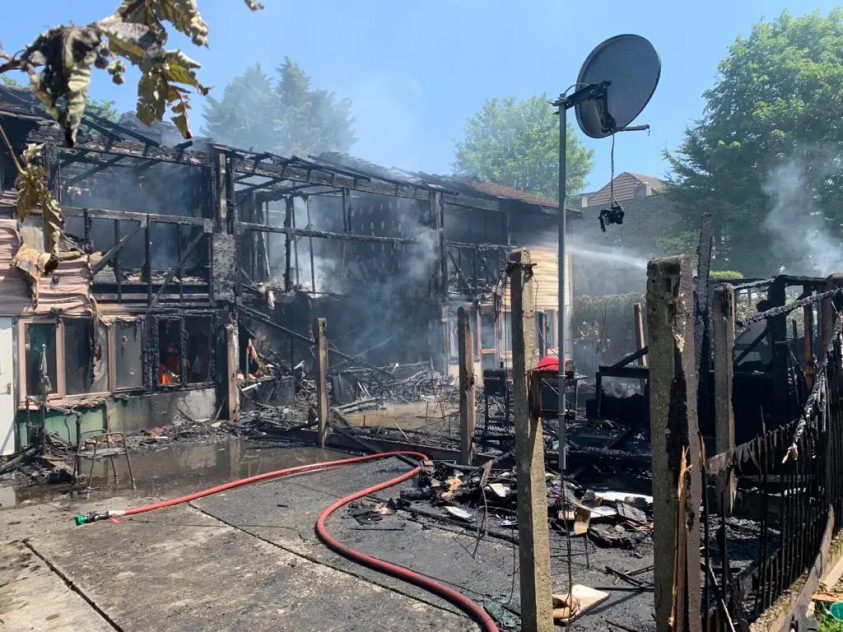
A fire in summer 2023 started in a council-owned property in Moss Hall Grove, West Finchley, and rapidly spread across the terrace of four properties.
There is a national approach to improving fire safety in high-rise blocks of flats; now it is time to do the same for low-rise housing, writes Cath Shaw, Acting Chief Executive of Barnet Council.
In the summer of 2023, a devastating fire swept through a row of terraced houses in our north London borough in minutes, completely gutting them. Fortunately, the blaze occurred during the day and no one was seriously hurt. However, independent fire safety officers found the two-storey timber framed homes, built between the 1920s and 1960s by the former London County Council and Greater London Council, had UPVC or timber cladding and inadequate fire stopping.
Following further investigation, we identified over 580 homes of similar construction to those that burned down, of which around two thirds are freehold or leasehold properties. All these homes have been identified under the Housing Act 2004 as being highly likely to have a ‘category one hazard’ which places a legal duty on the council to take remedial action. However, the total cost of replacing cladding on privately owned residences could be over £13m and, while we have offered to undertake the works on behalf of homeowners and fund the up-front costs, this will ultimately be passed to homeowners at an estimated cost of up to £23,000 per property.
We think the issue we have in Barnet may be just the tip of the iceberg and other local authorities could also be affected. However, while national guidance exists on what to do for blocks of flats over 11 metres tall, there is no specific guidance for low rise homes.
We have briefed the Department for Levelling Up, Housing and Communities (DLUHC), asking them to provide guidance and initiate a nationwide coordinated response, and we are also liaising with the LGA, the GLA and London Councils to raise awareness of the issue.
What we are doing
Following initial investigations, the council hand-delivered letters to householders to notify them of the situation and included a hotline number to call, details of a drop-in session, as well as some frequently asked questions and a link to a web hub containing further information. While we have stressed there is no imminent danger, we have also provided fire safety advice and offered to install free smoke detectors to all properties that need them.
We’ve taken great lengths to provide essential information and to liaise with residents, including hiring an independent resident engagement expert, offering group and individual engagement sessions and sending regular update letters based on the queries we’re receiving.
However, unsurprisingly, it is the homeowners who have been most concerned and upset by the news; in particular, having to pay the cost of replacing the cladding on their homes.
We are doing what we can to minimise the impact this will have by offering a loan and repayment scheme to residents who choose to commission the council to undertake the remediation works. With cross-party support, our Leader has also written to the Department for Levelling Up, Housing and Communities (DLUHC) to request national guidance and to see what financial support the government can offer. We are also working with the London Fire Brigade, the GLA, LGA, Regulator of Social Housing and local housing associations to raise awareness of the issues and look for a constructive way forward.
We will soon start inspecting individual homes to see exactly what work needs to be done. Vulnerable residents, including older people with mobility issues, are being prioritised in a programme of work that we expect to take up to three years to complete.
Implications for other councils
Given the common nature of the construction type of the houses in question, we know this is likely to be a widespread issue across the country.
We appreciate that this will be unwelcome news for councils and residents; however, we have a mandated duty to keep housing conditions safe for all, especially regarding serious hazards.
The cost of fire safety works on this scale is beyond the finances of councils and our Members are urging the government to provide financial support for freeholders. Without it, we could see more households facing ruinous bills from property construction issues which was not their fault.
